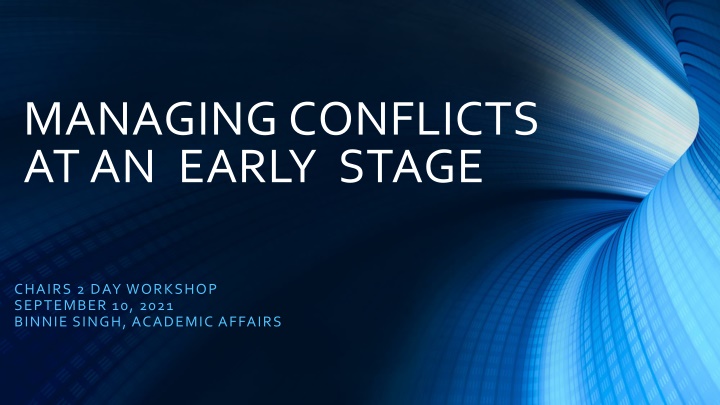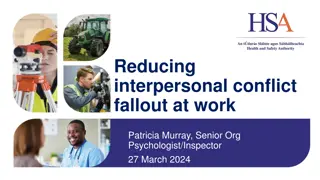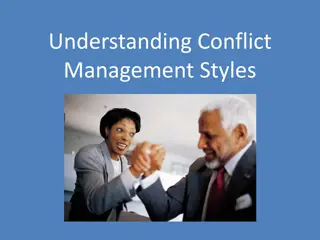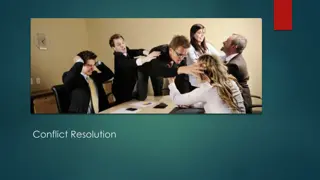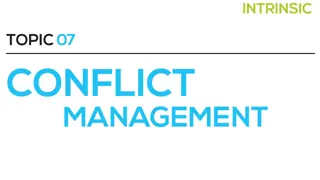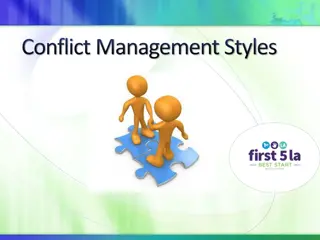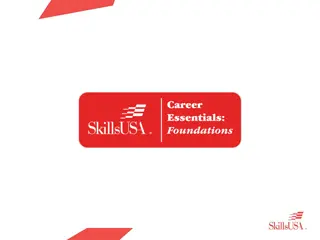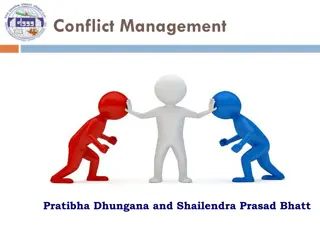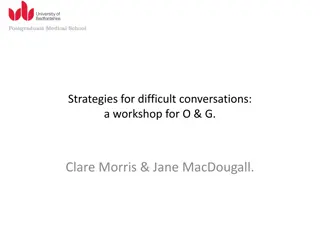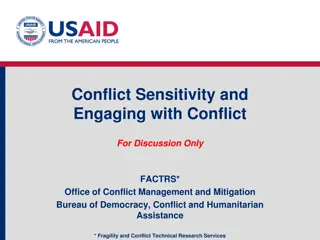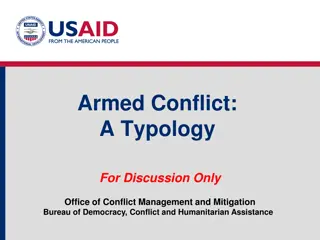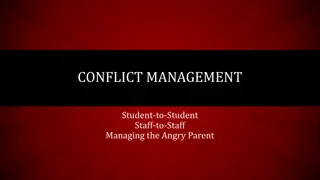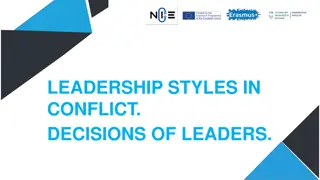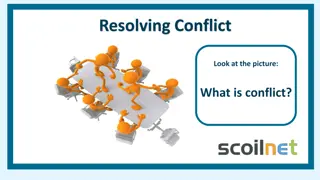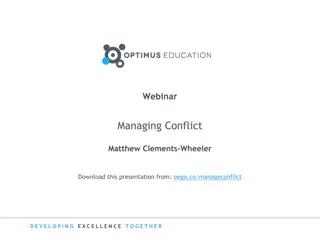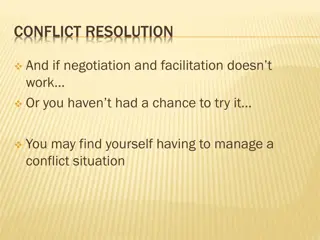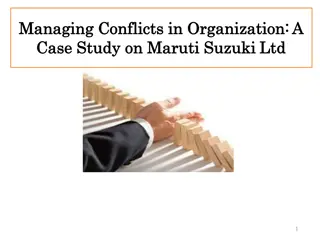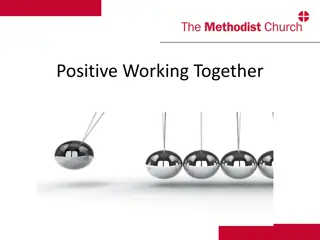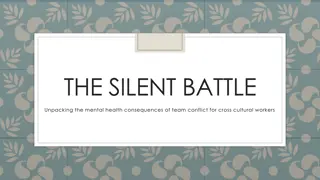Effective Conflict Management Strategies in Academic Settings
Explore proactive steps, conflict management strategies, and unique factors impacting conflict in academic environments. Discover how to address conflicts early, utilize resources, and promote open communication to minimize escalation. Case studies, group work, and interactive discussions enhance learning in this comprehensive workshop.
Download Presentation

Please find below an Image/Link to download the presentation.
The content on the website is provided AS IS for your information and personal use only. It may not be sold, licensed, or shared on other websites without obtaining consent from the author.If you encounter any issues during the download, it is possible that the publisher has removed the file from their server.
You are allowed to download the files provided on this website for personal or commercial use, subject to the condition that they are used lawfully. All files are the property of their respective owners.
The content on the website is provided AS IS for your information and personal use only. It may not be sold, licensed, or shared on other websites without obtaining consent from the author.
E N D
Presentation Transcript
MANAGING CONFLICTS AT AN EARLY STAGE CHAIRS 2 DAY WORKSHOP SEPTEMBER 10, 2021 BINNIE SINGH, ACADEMIC AFFAIRS
Overview/Agenda Conflict in academia Proactive steps to take Steps to conflict management Case studies GROUP WORK Resources The aftermath of conflict Questions/Discussion
Objectives for Today Provide strategies to address issues and minimize potential for escalation Increase awareness of ripple effect of conflict Become aware of and utilize resources for department chairs in managing conflict Identify gaps in support for chairs what issues aren t being addressed adequately?
SCENARIO You ve noticed that two members of your department seem to be at odds. You used to see them chatting in each other s offices, often going out for coffee/lunch, and joking together at meetings. You realize that lately, you haven t seen any of that happening. In fact, they seem to be going out of their way not to sit near each other in department meetings. Is there anything that concerns you about this situation? Do you have a role to play?
Unique factors in academia that impact conflict management Faculty autonomy & independence Differing philosophies Competition for limited resources within the college/school/ discipline Team-oriented decision- making on program issues/changes Lack of preparation for managing people Lengthy faculty careers Rotational nature of leadership Power dynamics OTHER FACTORS? Source: Mending the Cracks in the Ivory Tower: Strategies for Conflict Management in Higher Education by Cynthia Berryman-Fink
Be proactive Living the Principles of Community eCourse (and facilitated discussion, speakers, etc.) Use faculty meetings to set climate and allow for input & feedback Foster discussion regarding how, as a department/group and interpersonally, issues are addressed Follow through and follow up consistently Model effective behavior and engagement Do you all do any of this? If so, how has it worked?
Steps to managing conflict Plan Act Resources (consult) Document
Plan: Questions to ask and share with resources Potential policy violation? Required to notify anyone? What harm is caused by this conflict? What do I know about the parties? Is there prior history? Who would know? (This informs next steps.) Who can help determine the best approach? Logistics - when, where, and how to intervene?
Act: Things to consider Intervene early and as needed! Perfection is not the goal You know the person, what approach will work Depending on the issues, such as involving grad students, grad chair connects and works with dept chair One example: Documented conversations with talking points from Academic Affairs keep the conversation on track
Resources: Consulting Your Dean s Office can be a great place to start (may differ for grad chairs) They may be familiar with the issue and have insights and strategies to address the problem. Academic Affairs and Graduate Studies, depending on the issues, would be good next offices to consult about these types of issues. We may have more history about the parties involved and can offer ideas on approach.
Resources: Consulting (contd) Reasons to consult with campus resources: Reduce potential for escalation Responding and managing in a manner consistent with the level of issue You don t have to be the expert Extra help You may be too close to those involved (colleagues) need outsider s view Large issues, policy implications Share the liability Ideas on some of the campus resources that could be useful? Note: Acad Affairs works regularly and closely with a number of campus resources
WHEN MUST YOU CONSULT OR ELEVATE AN ISSUE?
CHOICES: HOW AND WHEN TO RESPOND Low Immediacy High Involvement High Immediacy High Involvement Involvement Low Immediacy Low Involvement High Immediacy Low Involvement Immediacy Source: How to Confront a Bully, David Maxfield (Crucial Conversations and Influencer)
SCENARIO The tension seems to be increasing between your two faculty members. Yesterday, you overheard two graduate students discussing the friction between these two professors. Each of these students works with one of these professors, and they ve all been collaborating on a project until recently. The students are expressing frustration about how their work on the project is stalled since these two professors won t talk to each other and have recently bad-mouthed each other in front of the students. What issues, if any, come up for you? What, if anything, will you do or say?
Document: Document for yourself along the way, as needed (note to file) When appropriate, document back to the individual(s) Don t keep unnecessary documentation in your file If this has happened before, documenting may not be enough may need to elevate (dean, Academic Affairs, Grad Studies, etc.)
The Aftermath Confidentiality - need to know Ripple effect Support services
Tips for minimizing harm Share what can be shared (consult about this with central campus resources, e.g., Academic Affairs, Counsel) --- ambiguity breeds fear and catastrophizing Over-communicate People don t hear well when they re stressed Accept and promote the idea that conflict is part of being human
LETS ACKNOWLEDGE You can t control other people s actions, decisions, etc. You re close to those involved Fight or flight a body s response to threat (reputational, emotional, not necessarily physical) Anxiety is a response to emotion, not an emotion itself (Are you angry, sad, guilty, apprehensive )
